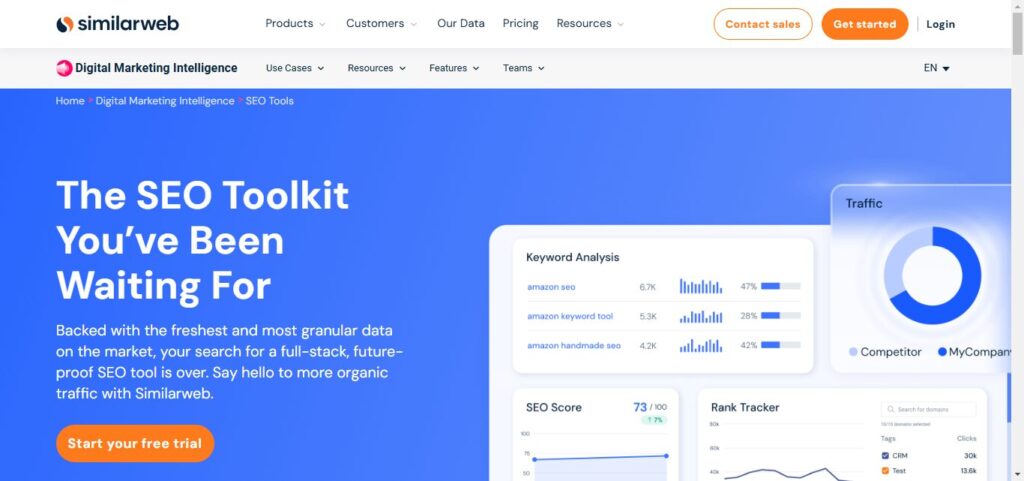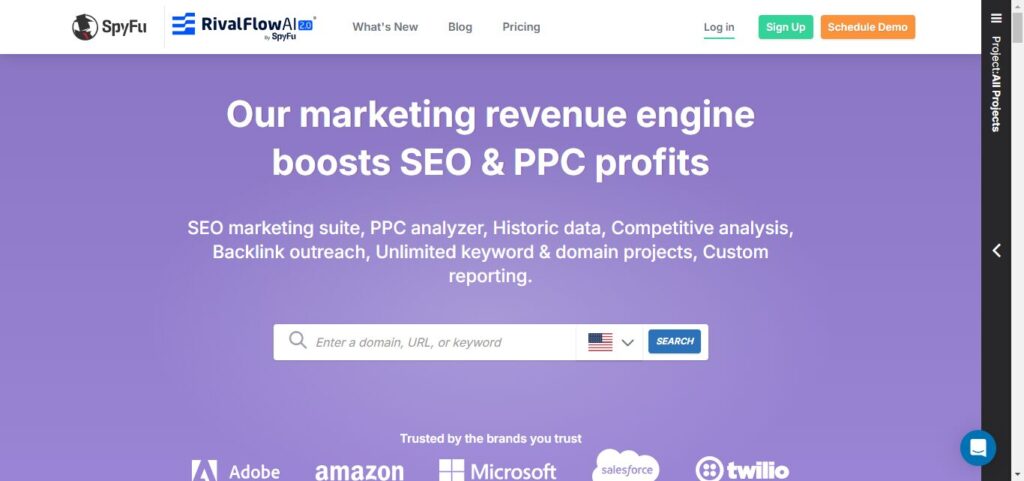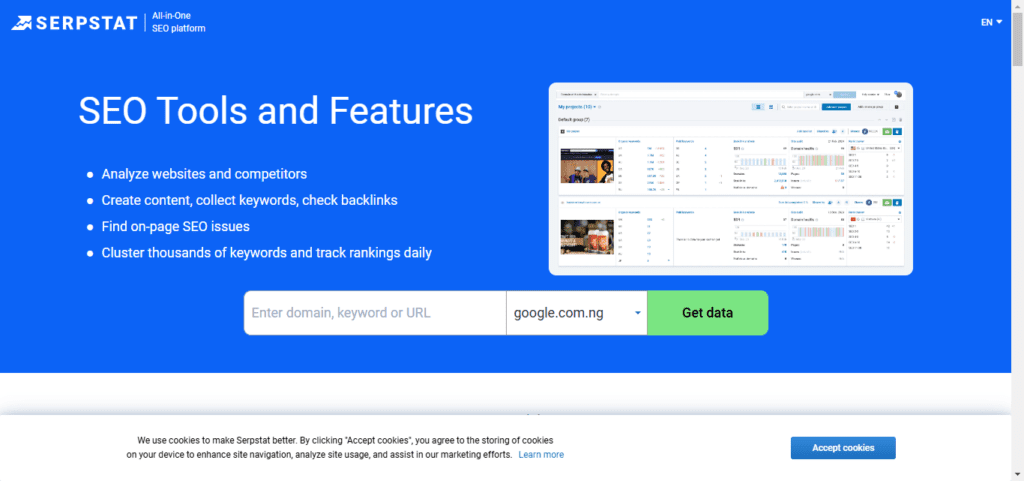Now that you’ve just published, you think it’s an amazing blog post. You’ve poured your heart into the writing, shared valuable insights, and hit that publish button with excitement. But days pass, and… crickets. Your post is buried somewhere on page 10 of Google, invisible to the world, especially now that AI has changed the game. If you are not on page one, then nothing for you.
Sound familiar? You’re not alone.
Every blogger faces this frustrating reality, especially in this new era,” AKA” the age of AI. The truth is, creating great content is only half the battle – the other half is making sure people can actually find it. That’s where SEO tools become your secret weapon.
The good news? You don’t need to break the bank or become an SEO technical wizard to start seeing results. From free options that pack a serious punch to premium tools that can revolutionize your entire approach, there’s something for every blogger and every budget.
Ready to stop playing the guessing game and start driving real, organic traffic to your blog? Let’s dive into the 7 best SEO tools that successful bloggers use today – and discover which one might be the game-changer for your blog optimization.
7 Best SEO Tools for Webmasters
- SEMrush
- Ahrefs
- Moz Pro
- Ubersuggest
- Similarweb
- SpyFu
- Serpstat
1. SEMrush

SEMrush is a comprehensive digital marketing tool that provides a wide range of features, including keyword research, on-page SEO analysis, backlink tracking, and competitive analysis.
It enables users to optimize their websites for search engines and improve their online visibility effectively.
- Site Audit – Scans your website for SEO issues (like broken links or slow load speeds) and suggests fixes to improve performance.
- Keyword Research Tools – Helps you find the best keywords to target for your blog by showing search volume, competition, and traffic potential.
- Competitor Analysis – Lets you see which keywords and content are working for your competitors, helping you improve your own strategy.
- Content Analyzer – Analyzes your existing blog posts to suggest SEO improvements and help you boost rankings.
- Position Tracking – Tracks how well your blog ranks for chosen keywords over time, helping you measure your SEO success.
- Backlink Analysis – Shows the quality of backlinks to your site and helps you find opportunities for building more.
- SEO Content Template – Generates content briefs with SEO recommendations (like word count and keywords) to help you optimize your blog posts.
- SEO Writing Assistant – Provides real-time SEO suggestions while you write, making sure your content is optimized for search engines.
- On-Page SEO Checker – Gives actionable advice for improving individual blog pages to boost their SEO performance.
- Topic Research Tool – Suggests trending topics and content ideas based on what people are searching for in your niche.
- Social Media Toolkit – Helps you track the performance of your social media posts, improving your overall online presence.
- Local SEO Tools – Optimizes your blog for local search results by helping you target location-based keywords.
- Analytics Reporting – Creates custom SEO reports to track your blog’s performance, helping you understand what’s working.
- User Experience Insights (UX) – Provides insights into how users interact with your site, helping you improve their experience and your SEO.
- Mobile SEO – Checks your blog’s mobile-friendliness and suggests improvements for better rankings on mobile searches.
Free and paid plans
- Semrush has a free basic plan that allows you to use its basic features for 5 maximum requests before asking you to upgrade.
- Its paid plans start at $139.95 if you are paying monthly and $117.33 if you are paying annually (12 months straight).
If you are looking for an industry-standard SEO tool that offers you all the SEO and keyword search features, then Semrush is a very good option for you.
2. Ahrefs

Rating: ⭐⭐⭐⭐⭐
Ahrefs is primarily known for its powerful backlink analysis capabilities and extensive keyword research tools. It allows users to monitor their website’s performance, analyze competitors, and discover new content opportunities, making it invaluable for SEO professionals and marketers.
- Site Explorer – Analyzes your blog’s backlinks, organic traffic, and top-ranking pages to identify strengths and areas for improvement.
- Keyword Explorer – Helps you discover the best keywords to target by showing search volume, keyword difficulty, and click potential.
- Site Audit – Crawls your site to find technical SEO issues like broken links, slow load times, and missing meta tags, with recommendations for fixing them.
- Backlink Checker – Lets you analyze your blog’s backlink profile and explore where your competitors are getting their backlinks from.
- Content Explorer – Finds the most popular content related to your niche, helping you discover content ideas and identify trends.
- Rank Tracker – Tracks your blog’s rankings for target keywords, helping you monitor progress and adjust your strategy.
- Competitor Analysis – Allows you to see what keywords and content are driving traffic to your competitors’ sites, so you can target similar opportunities.
- Link Intersect Tool – Identifies sites that link to your competitors but not to you, giving you opportunities for new backlinks.
- Content Gap Tool – Shows keywords that your competitors rank for but you don’t, helping you find content opportunities you might have missed.
- SEO Toolbar – A browser extension that provides quick SEO data on any page you visit, showing things like domain rating, backlinks, and keyword rankings.
- Domain Comparison Tool – Allows you to compare your blog with competitors in terms of backlinks, traffic, and keyword rankings, helping you identify areas to improve.
- Traffic Analytics – Shows you how much traffic competitors are getting, what pages are performing best, and where their traffic is coming from.
- Site Structure Analysis – Helps you structure your blog in an SEO-friendly way, ensuring internal linking and URL structures are optimized.
- Broken Link Checker – Finds broken links on your blog, allowing you to fix them and prevent any negative impact on SEO.
- Batch Analysis – Lets you analyze multiple URLs at once to compare their SEO metrics like backlinks, organic traffic, and more.
Free and paid plans
Ahrefs offers a series of free tools with limited features on each of them. They offer four different paid plans.
- The basic plan starts at $129/month if you are paying month by month and $108/month if you are paying for 12 months straight.
This annual plan gives you two months free and starts counting into your 12-month subscription after your first two months are exhausted.
3. Moz Pro

Rating: ⭐⭐⭐⭐☆
Moz Pro offers a suite of SEO tools that focuses on keyword tracking, site audits, and on-page optimization.
With its user-friendly interface and educational resources, Moz Pro helps users understand and implement effective SEO strategies to boost their search engine rankings.
- Site Explorer – Allows you to analyze your website’s backlinks, organic traffic, and discover how your site is performing in search rankings.
- Keyword Explorer – Helps you find the best keywords for your blog by showing search volume, difficulty, and opportunity metrics for each keyword.
- Page Optimization – Provides on-page SEO recommendations for individual pages, helping you optimize them to rank better on search engines.
- Link Explorer – Lets you check your blog’s backlink profile, analyze link quality, and find new backlink opportunities.
- Rank Tracker – Tracks your blog’s rankings for specific keywords over time, allowing you to monitor SEO progress and adjust your strategy.
- MozBar (Browser Extension) – A browser extension that gives you SEO data like page authority, domain authority, and backlink information for any page you visit.
- Content Suggestions – Provides content recommendations based on keyword research, helping you create blog posts that are more likely to rank.
- On-Page Grader – Analyzes a webpage’s SEO, offering suggestions to improve content, keywords, and page structure to rank better.
- Link Building Tools – Helps you find potential sites to target for backlinks and track the effectiveness of your link-building efforts.
- Moz Local – Helps optimize your blog for local SEO by improving its visibility in local search results, especially useful if your blog has a local focus.
- SEO Reports – Generates custom SEO reports, tracking performance and offering insights into how your blog can improve in search rankings.
- Domain Authority (DA) – Provides a metric (Domain Authority) that measures your site’s credibility and potential to rank, useful for evaluating your SEO strength.
- Keyword Difficulty Tool – Shows how competitive a keyword is and whether it’s worth targeting for your blog, helping you focus on the most achievable opportunities.
- Spam Score – Analyzes the risk of a backlink profile containing spammy links that could harm your site’s SEO, helping you clean up toxic backlinks.
- Site Crawl – Crawls your website to detect and fix any technical SEO issues like broken links, missing metadata, or slow pages. month by month, while it’s $39/month if you are paying for 12 months in a row [annual plan].
You can sign up for Moz’s 30-day free trial on this page.
4. Similarweb

Rating: ⭐⭐⭐⭐☆
Similarweb specializes in website traffic analysis and competitor research.
It provides insights into website performance, audience demographics, and engagement metrics, helping users understand market trends and make informed decisions about their digital marketing strategies.
- Website Traffic Analysis – Provides data on your blog’s traffic volume, sources, and audience demographics, helping you understand where your visitors are coming from.
- Competitor Analysis – Allows you to analyze competitors’ traffic, audience interests, and top-performing pages, giving you insights to improve your content strategy.
- Traffic Sources Breakdown – Shows how traffic is distributed across different channels (organic search, paid search, referrals, social media, etc.), helping you focus on the most effective sources.
- Audience Interests – Reveals the interests and behavior of your blog’s audience, helping you tailor content to meet their needs and attract more traffic.
- Keyword Analysis – Helps you identify which keywords are driving traffic to both your site and your competitors, enabling you to refine your keyword strategy.
- Geographic Data – Provides insights into the geographic locations of your audience, helping you target specific regions or create content that appeals to a global audience.
- Top Referring Sites – Shows which websites are sending traffic to your blog, allowing you to build relationships or gain backlinks from high-traffic sites.
- Social Media Insights – Analyzes social media traffic, revealing which platforms are driving the most traffic to your blog, and helps you optimize your social media strategy.
- Mobile vs. Desktop Traffic – Tracks the proportion of your visitors using mobile vs. desktop, helping you optimize your blog’s mobile experience for better SEO and user experience.
- Market Trends and Industry Analysis – Offers insights into market trends, providing you with data about industry performance and the most popular topics in your niche.
- Referral Traffic Insights – Shows which websites or platforms are linking to your blog, helping you discover new link-building opportunities.
- Search Engine Optimization (SEO) – Provides organic search data to help you understand how well your blog ranks for various keywords, and how you compare with competitors in SERPs.
- Brand Analysis – Helps track your blog’s brand mentions and online presence, offering insights into your brand’s awareness and reach.
- Website Engagement Metrics – Shows engagement data like average visit duration, pages per visit, and bounce rate, helping you understand how users interact with your blog.
- Industry Benchmarking – Compares your blog’s performance against industry averages, helping you identify areas where you can improve and gain a competitive edge.
SimilarWeb is ideal for bloggers who want to gain a deeper understanding of their site traffic, audience, and competitors. It helps in refining marketing strategies, improving SEO, and identifying opportunities for growth.
5. Ubersuggest

Rating: ⭐⭐⭐⭐
Ubersuggest is an accessible SEO tool designed for beginners and small businesses.
It provides keyword suggestions, competitive analysis, and content ideas, making it easy for users to identify growth opportunities and improve their online presence without breaking the bank.
- Keyword Research – Helps you discover high-traffic keywords and gives you data on search volume, keyword difficulty, and competition to optimize your content strategy.
- Site Audit – Analyzes your blog’s health, identifying SEO issues like broken links, slow load times, and missing meta tags, with actionable recommendations for improvement.
- Rank Tracking – Tracks your blog’s rankings for specific keywords over time, helping you measure your SEO performance and adjust your strategy accordingly.
- Backlink Analysis – Shows the backlinks pointing to your site and your competitors, helping you find new link-building opportunities and track the quality of your backlinks.
- Content Ideas – Provides content suggestions based on popular search queries and top-ranking pages, helping you find blog topics that are likely to attract traffic.
- Competitor Analysis – Lets you analyze your competitors’ websites to see which keywords they’re ranking for, how much traffic they get, and which content is performing best.
- SEO Dashboard – Provides an overview of your site’s SEO health, including traffic insights, keyword rankings, and backlink data, all in one place.
- On-Page SEO Analysis – Scans individual blog posts or pages and gives recommendations to optimize your on-page SEO (e.g., keyword usage, meta descriptions, content length).
- Traffic Analyzer – Shows how much traffic your blog or competitors are getting, including the top sources of traffic and user behavior.
- Domain Overview – Provides an in-depth look at your domain’s SEO performance, including backlinks, top keywords, and search traffic, helping you track your blog’s overall SEO progress.
- Local SEO Tools – Helps you optimize for local search, providing keyword and competitor insights specific to your geographical location.
- Keyword Difficulty Analysis – Measures how hard it is to rank for a specific keyword, helping you choose keywords with the best chance of ranking on search engines.
- Website Speed Analysis – Checks your blog’s loading speed and provides suggestions for improvement, which is important for both user experience and SEO.
- Social Media Insights – Analyzes your blog’s social media traffic and performance, helping you optimize your content strategy across platforms.
- Reports & Alerts – Lets you set up custom reports and alerts for tracking changes in keyword rankings, backlinks, and overall site performance.
Ubersuggest is a great tool for bloggers who want an all-in-one solution for keyword research, content creation, site optimization, and tracking SEO progress, all at an affordable price.
Free and paid Plans
- Ubersuggest offers you a free plan with limited functionality.
- It offers three paid plans: 3 different monthly plans and 3 different lifetime plans.
- The basic monthly plan starts at $12, whereas the lifetime plan starts at $120. The bigger the plan, the more functionality it offers.
6. SpyFu

Rating: ⭐⭐⭐⭐
SpyFu focuses on uncovering competitor strategies in both SEO and PPC.
By analyzing competitors’ keywords, ad spending, and overall performance, SpyFu empowers users to refine their own marketing tactics and improve their ROI.
- Keyword Research – Helps you discover profitable keywords, showing search volume, competition level, and suggested keywords that can improve your blog’s SEO.
- Competitor Analysis – Analyzes your competitors’ keywords, ads, and backlinks, allowing you to understand their strategy and uncover opportunities to outrank them.
- Keyword Rankings – Tracks the ranking of your blog’s keywords over time, helping you monitor SEO performance and adjust your strategy accordingly.
- Backlink Analysis – Provides insights into your blog’s backlinks and your competitors’ backlink profiles, helping you find new link-building opportunities.
- AdWords Competitor Analysis – Shows the keywords your competitors are bidding on in paid search ads, allowing you to discover new keywords that could be valuable for both paid and organic traffic.
- SEO Reports – Generates detailed SEO reports on your website’s performance, including keyword rankings, backlinks, and overall SEO health.
- Domain Overview – Offers a comprehensive overview of your blog’s domain, including keyword rankings, traffic data, and backlink profiles, helping you track SEO progress.
- Keyword Suggestions – Provides related keyword suggestions based on your target keywords, helping you expand your keyword strategy to target a wider audience.
- Organic vs. Paid Search – Allows you to compare the organic and paid search performance of your blog and your competitors, helping you optimize your SEO and PPC strategies.
- SERP Analysis – Analyzes the search engine results pages (SERPs) for specific keywords, showing the top-ranking pages and their SEO strategies.
- Content Gap Analysis – Identifies keywords that your competitors are ranking for, but you are not, helping you find new content ideas and keyword opportunities.
- SpyFu Kombat – Allows you to compare your blog with competitors and provides a visual map of keyword and backlink overlaps, helping you uncover gaps and areas to improve.
- SEO Competitor Comparison – Compares your blog’s SEO performance to your competitors’, giving you insights on how to improve your rankings and outpace them in search results.
- Historical Data – Provides historical keyword ranking data, showing how your blog’s rankings have changed over time, and helping you understand past performance trends.
- PPC Research – Provides insights into the paid search strategies of your competitors, helping you identify profitable keywords for both organic and paid campaigns.
SpyFu is great for bloggers who want to monitor their SEO performance, analyze competitors, and find new keyword opportunities to boost organic traffic and stay competitive. It excels in both SEO and PPC analysis, helping you fine-tune your overall digital marketing strategy.
Pricing and paid plans
SpyFu offers three paid plans.
Basic plan;
- $39 when paying monthly.
- $33/month when paying annually.
7. Serpstat

Rating: ⭐⭐⭐⭐
Serpstat is an all-in-one SEO platform that combines keyword research, site audits, backlink analysis, and rank tracking.
It is designed to streamline the SEO process for users looking for a comprehensive solution to manage and enhance their online presence effectively.
- Keyword Research – Helps you discover profitable keywords by showing search volume, competition, and keyword difficulty, enabling you to choose the best keywords for your blog.
- Site Audit – Analyzes your blog for SEO issues like broken links, missing meta tags, and slow page load speeds, offering actionable recommendations for improvement.
- Rank Tracking – Tracks your blog’s keyword rankings over time, providing insights into your SEO performance and helping you monitor changes in search rankings.
- Competitor Analysis – Lets you analyze competitors’ websites to understand their keyword strategies, traffic, and backlinks, helping you identify new opportunities to outrank them.
- Backlink Analysis – Provides detailed information about your blog’s backlink profile, helping you assess the quality of backlinks and find new linking opportunities.
- SERP Analysis – Analyzes the search engine results pages (SERPs) for specific keywords to help you understand which pages are ranking and how you can improve your content to outrank them.
- Content Marketing Tools – Offers tools to identify trending topics and suggest content ideas based on what’s popular in your niche, helping you create content that attracts traffic.
- SEO Dashboard – Provides an overview of your blog’s SEO health, including keyword rankings, backlinks, and traffic data, all in one easy-to-navigate dashboard.
- Website Audit for Mobile – Checks how mobile-friendly your blog is, offering insights to optimize mobile user experience and improve mobile SEO.
- Keyword Difficulty Analysis – Measures the level of difficulty for ranking specific keywords, helping you choose keywords that are easier to rank for and more likely to drive traffic.
- Competitor Keyword Gap – Helps you identify keywords that your competitors are ranking for but you are not, allowing you to target new content opportunities.
- Traffic Analysis – Provides insights into your blog’s traffic sources and performance, helping you understand how visitors are finding your content.
- On-Page SEO Analysis – Analyzes individual pages of your blog, offering suggestions for improving on-page SEO such as keyword optimization, internal linking, and content structure.
- Link Building Tool – Helps you find new link-building opportunities by showing where competitors are getting their backlinks, allowing you to target high-quality sites for backlinks.
- Brand Monitoring – Tracks your brand mentions across the web, helping you understand your brand’s online presence and identify new opportunities for engagement.
Serpstat is an ideal tool for bloggers who want to improve their website’s performance by focusing on keyword research, competitor analysis, backlinks, and on-page SEO. Its all-in-one platform makes it easy to track and improve SEO over time.
Serpstat Plans and Pricing
Serpstat offers four paid plans, and here is the most basic plan among them.
- $59/month
- $600/annually
Post End.
The Fastest Way to Start Making $10,000/month as a New Blogger
1. Get Started with HostGator – Your Blog’s Best Friend
The first step to making money blogging is having a solid foundation. HostGator offers affordable, reliable hosting, a free domain, and easy access to WordPress — the best platform for new bloggers. Sign up today and get your blog online in minutes.
👉 Get Started with HostGator Now!
2. Choose a Profitable Niche
Pick a profitable niche you’re interested in and ready to dive into. Focus on one niche, and be prepared to create content that solves your audience’s problems. You can still choose your niche after your blog is live online.
3. Create High-Impact Content
Start by making lists of your niche “money posts” [Posts good for affiliates or with high traffic volume suitable for ads]. These “money posts” are your primary focus. Then, also create supporting posts to build traffic and rank better in Google. The more content you create, the faster you’ll grow your audience.
4. Success Rules to Follow:
- Focus on Your Niche: Stick to one niche and become an expert in it.
- Quality Content Only: Focus on delivering value with every post.
- Have a Plan: Set clear goals for content creation and promotion [Like how many posts you intend to create and your plan on promoting them to help you grow your initial traffic].
HostGator has everything you need to get started quickly, with a platform that grows as you do. Ready to start making money with your blog?
👉 Launch Your Blog with HostGator Today
Doing these things will increase your chances of making more than $10,000/month consistently after 6 months to one year.











